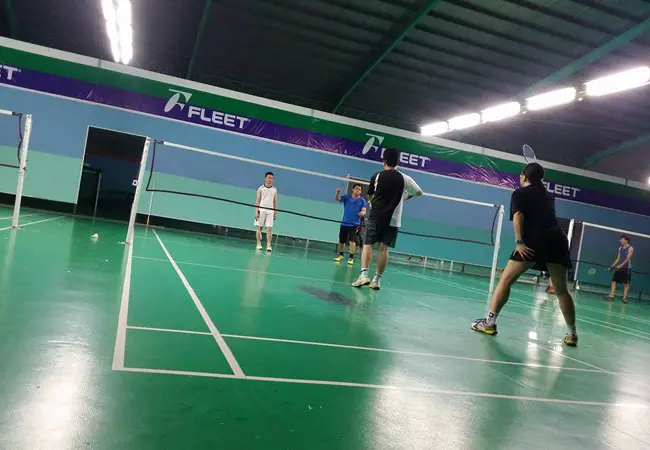There are less than 6 million people in Denmark, yet the country has produced 10 World Champions. While China has 1.43 billion people and Indonesia has 230 million people, they produced even more World Champions. How can Denmark compete when we have so few people? We are obsessed with quality over quantity.

I am not saying that the Chinese and Indonesians don’t focus on quality, far from it. They are producing excellent players with fantastic techniques. However, because we have far fewer players to choose from in Denmark and much less time to dedicate to training, we must be sure that we are focusing on quality.
To produce high-quality results, we have to start by focusing on technique. Improving your technique takes time and lots of practice, but with the right instruction, I believe that you can see massive improvements in your technique.
I ever have a chance to talk to Kaveh Mehrabi, who is Iran’s first Olympian in badminton. He chose to move to Denmark because it was the best place for him to go to bring him to the next level, and without doing so, he would not be an Olympian today.
Playing badminton is a great deal of fun, but let’s be honest with ourselves. Winning makes it that much more fun. But to win, you need to be good, and to be good generally takes practice. However, simply working hard is not going to cut it. You have to work smart too. You have to get serious about your training if you want to see drastic results. You have to be organized, and your training needs to have structure.
The difference between those who reach their potential and those who don’t are in the systems they develop to improve themselves and their discipline in executing those systems.
Great coaches understand this concept and will do whatever they can to put their players into a system that will further develop their skills and physical abilities.
If you don’t have access to a great coach who can develop a training system for you, then you’ll have to study on your own. It is doable, though, so long as you understand it is all about having a system that you follow religiously.
That’s not to say that your playing and training system cannot grow and adapt to new situations. It would be best to adapt and improvise, but it is easier to do so when you have the foundation of a strong system supporting you.
It’s not about what you can do once, but what you repeatedly do defines who you are. If being a great badminton player is who you want to be, you need to develop the habits of a great player. It’s all about routine, what you do regularly.
Build Your Workable System
I mean that you need to have a consistent way of training, where you plan what you are going to do and measure the results. You can’t randomly train with no idea what you are working on and where you want to go with your game.
I have a friend who is also a badminton player, and he is currently at the high B grader, verging on an A grade. He has been coaching young kids for some years now, and he currently has three main star players.
He always trained those kids hard and wished they would get to the highest level he wishes them to reach. They are also getting some state training every weekend and social and competition matches during the weekday.
His biggest problem with the kids is their footwork and some bad habits that appear to be creeping into their game.
He is trying very hard to fine-tune these young players to improve their balance, footwork, and endurance.
By the way, by having the right training system in place, these kids have recently been involved in a state tournament, and the two girls, in particular, have shined well. and come out with the C grade women’s title to the belt and an enormous amount of confidence and “bragging rights.”
So, again, having a workable system is really important!
Keep On Improving
We know that there are many parts of your game that improvement will be subjective, so measuring progress will be difficult, so keeping a training diary to track your mental state from day to day is helpful. Another idea would be to occasionally shoot the videos of yourself while playing and compare the videos. Do you look like you have improved in the later ones?
Endurance is a certain ability that takes a while to build up, but your team should excel with the proper training techniques. I would suggest having your team run for 30 minutes, not that hard…just enough to build up some sweat. Then in the middle and at the end of your workout, have them make some sprints. If you continue this every day, their endurance shall increase.
As for footwork, the below youtube video should sum things up on what your team should be focusing on in terms of getting your footwork down. Create workouts mirroring those footwork patterns, and that should make their footwork better as well.
Good To Have A Routine
Based on the scientific systems, it is good for a player to come out with a routine. The routine can be like taking 1 hour for jogging, foot drills, conditioning foot routines, bending like seat up push up, etc.
Such a routine will help for speeding and strengthen the lateral post.
Backhand Practice
For example, many players found it is rather hard for them to master the backhand skill. Basically, the backhand “whip,” as I call it, takes a while to develop.
It is hard to explain without showing you as I am not a professional trainer, but just a player who can do this. What you need to do is learn how to flick your wrist in, I guess.
A U form starting from the right side of the U. If you can watch someone do this, it would be easier to understand and probably learn.
Otherwise, keep your opponent away from your backhand, move him/her around going from clear to drop shot, cross courting your shots as much as possible. This causes ur opponent to be less likely to put a shot where he/she wants it to go.
For backhand tips, the most important thing is to use a modified backhand grip instead of the basic net kill backhand grip then. The best way to describe how to hit it is to pretend like you are whipping a towel and trying to make it snap, the same thing with the backhand. You don’t want to have any follow-through. Less follow-through will result in more power.
Whether you are a left-handed or right-handed player, you may feel that the power in your smashes is less just because you didn’t yield the right strength to swing.
You can practice getting the perfect power and placement in your smashes so that it is not easy for your fellow players to defend it.
You may keep on practicing until you can get quite good at aiming to shoot at the right spot, and the power of your smashes is going to be just right.
Participate More in Matches
Playing many matches, especially competitive (league play or tournaments), will give you the experience in those tough environments. Also, I would advise working on your fitness. If you are working hard physically, you learn to fight through the pain, the burning feeling in your legs and lungs. This will translate into a tougher mind as well.
No Typical Height and Weight Required
Some players have doubts, and they want to know the average body weight of a typical professional badminton player is?
As one of the players in my area, he used to play badminton when he was 70kg, then he stopped playing the sport for 5 years. He then started bodybuilding until he reached 105kg!
Now he is playing badminton again, and his weight goes down to 87kg. He is confused at some points and wonders if he is a bit too heavy to play badminton? He has powerful legs because he still has good training for his footwork.
In my opinion, I don’t think there is a typical height or weight for professional players. Some are tall and slender, while others are short and explosive.
I would tend to say that singles players are quite lightweight for whatever height they are. You don’t want any extra weight holding you down. If you’re looking to play competitively, I would say you’d want to drop some weight. Perhaps 10kgs or more.
However, what seems to be more important is your power relative to your weight. So, for example, if losing weight causes you to be a lot weaker, that’s not good. I would focus on improving your speed and fitness. If you lose weight as a result, then that’s okay.
Read also: How To Prepare For A Badminton Tournament?
